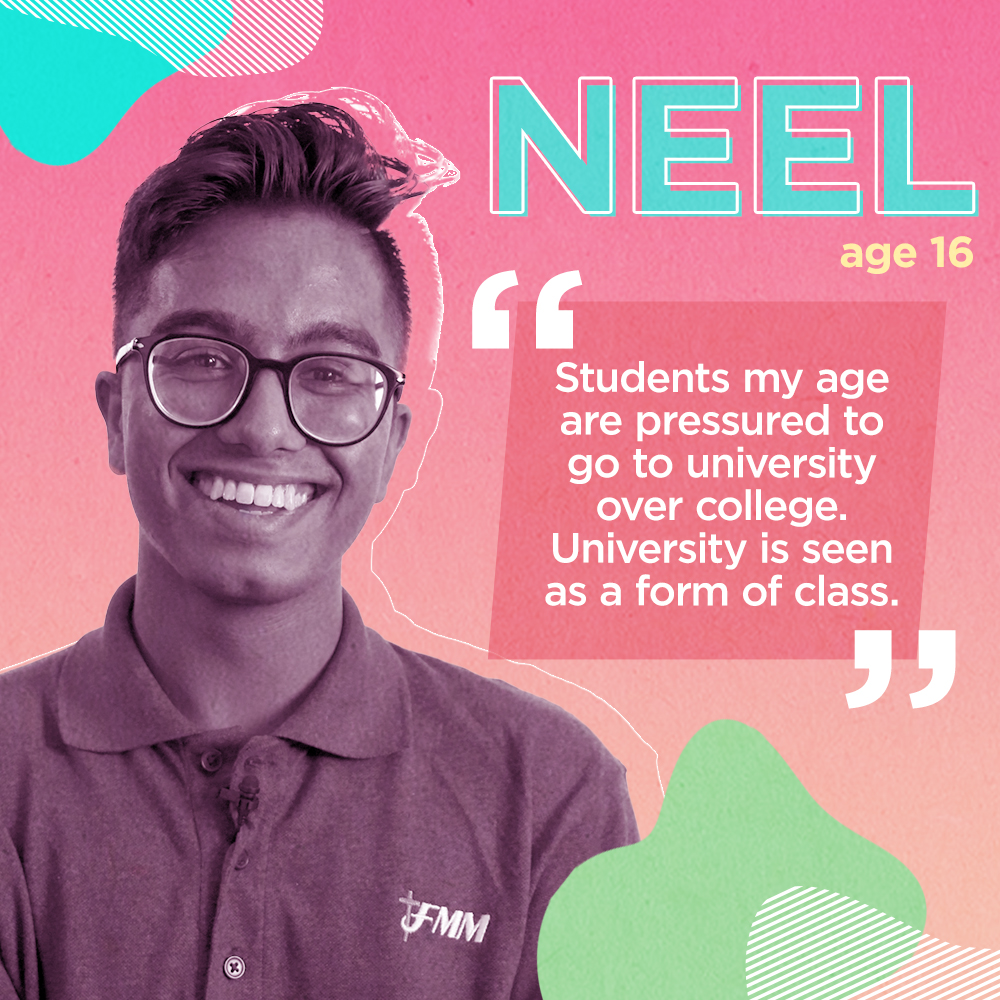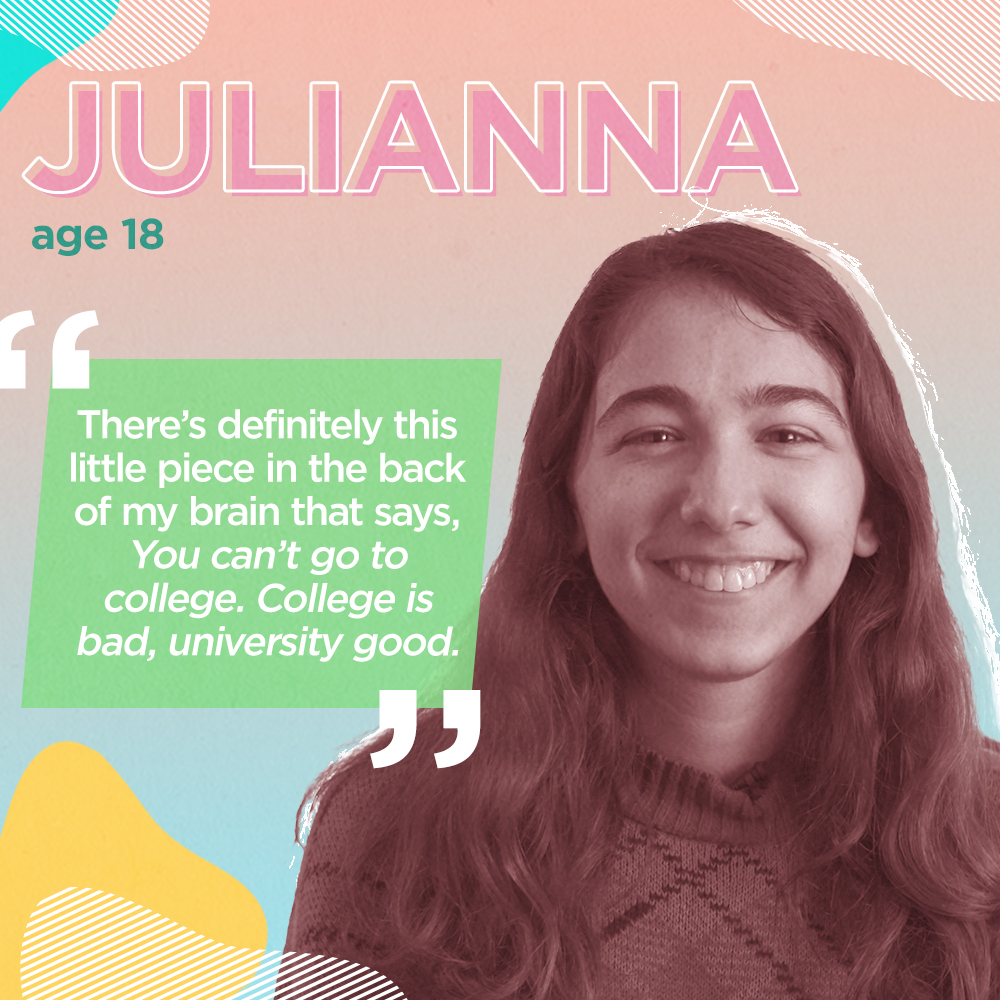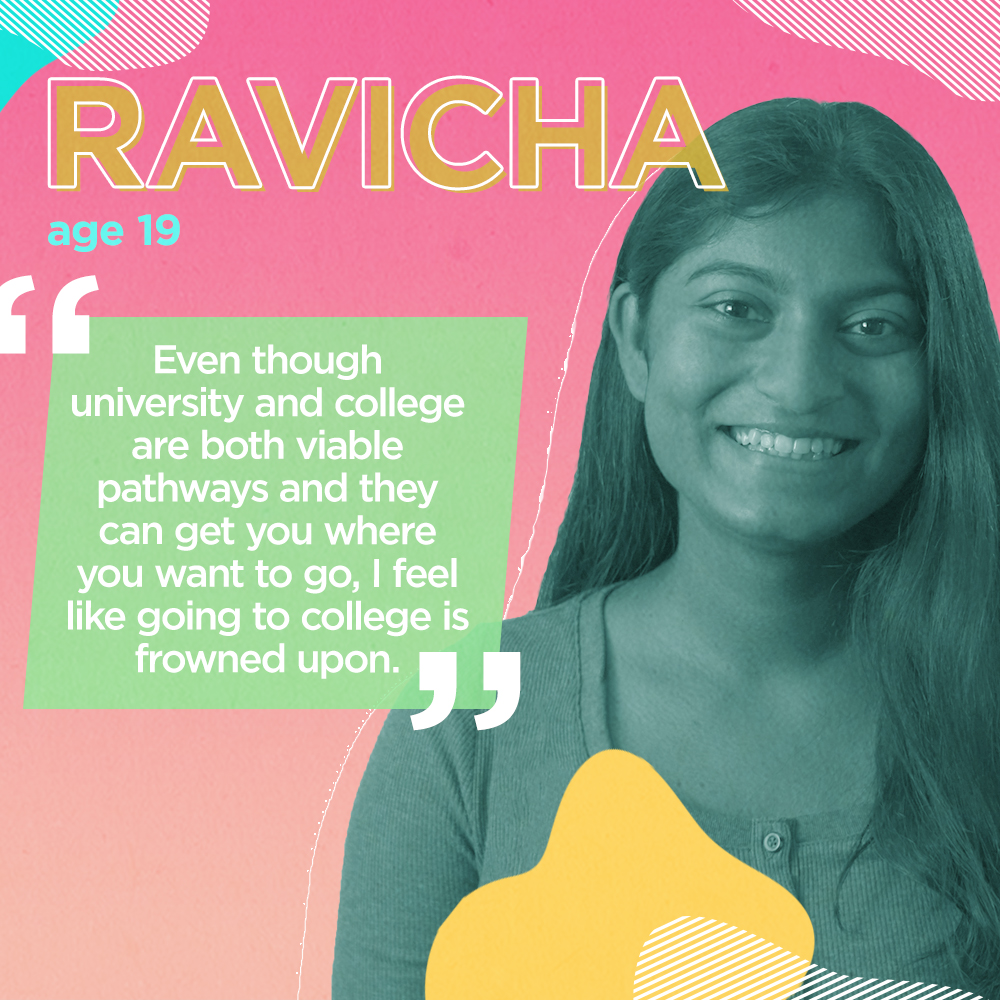
Justin Mclaughlin wishes he had a university degree under his belt.
He graduated from Conestoga College in Kitchener, Ont., with a business diploma in 2018. Like most new grads, he began the process of applying for jobs in his field.
But during the interview process over the years, the 24-year-old realized he was being passed over because of his college diploma.
READ MORE: ‘Failure to launch kids’ — Canadian students aren’t prepared for adulthood
“I’ve been interviewed and told my education credentials didn’t meet those of others,” he said. “My career pathway has seen a large roadblock. I (get) filtered out.”
Like Mclaughlin, some students are forced to choose one institution over the other. This can be a result of family pressure, finances and even misguided conversations around one type of post-secondary education being “better” than the other.
The pressure students feel is completely normal, but it can also leave them feeling overwhelmed and unsure of their decision in the first place. Experts say parents, as well as educators, need to do a better job at giving students a variety of options to approach their post-secondary education.
Choosing between college or university
Mclaughlin made the choice to go to college because he preferred its hands-on learning style and the more affordable price tag.
“Universities made me feel like an application number compared to a possible future community member (at college),” he said.
There’s no denying the stigma of choosing college over university still exists, and often, this idea can trickle down to the job market, says Linda Schweitzer, a professor of management and strategy at the Sprott School of Business in Ottawa.
“Historically, it was privilege that allowed you to go to university, and if somebody went to college when they could afford university, it was looked upon as, ‘why would you do that?'” she explained.
Mclaughlin is still dealing with the consequences of going down a path that wasn’t the right fit.
This year he planned to attend Lakehead University in Orillia, Ont., but the Ontario Student Assistance Program funding cuts in January forced him to defer his acceptance to 2020. Deferring his acceptance meant further delaying his ability to find a job in business.
“(The cuts) put university out of reach again due to my finances,” Mclaughlin said. “University is still praised and valued as prestige and those who are fortunate enough to afford it reap the benefits.”
Start with your passion and go from there
In retrospect, Mclaughlin would’ve chosen a college-university combined program. This is a combination Robert Shea, associate vice-president of academic and student affairs at Memorial University in Newfoundland, calls the “academic ladder.”
Shea encourages students to start with their passion and go from there — getting a diploma, entering the workforce and then going back for a degree to move up into management.
Using university, if needed, to supplement a college diploma is the best way to save time, money and emotional well-being, he explained.
WATCH: Global News asked 10 students if they felt there was a stigma around choosing college over university

After seeing many students who felt like they were “floundering,” or unsure of where they were going in university, Shea hopes more students and parents are open to this idea.
“What we as a society are not doing is providing those maps (to students),” he said.
“It’s about having students (understand) that there’s no wrong decision; it’s how you build on those things.”
This, he adds, can help improve institutions’ retention rates. When a student ends up choosing a post-secondary option that isn’t the best fit, there is a high chance they’ll drop out.
About 14 per cent of first-year students across the country dropped out of their university programs, according to the 2011 Youth in Transition Survey from Statistics Canada. When accounting for all undergraduate students, the number rose to 16 per cent.
The survey followed 963,000 students aged 18 to 20 who were in post-secondary institutions by 2005. By December of that year, roughly 143,000 had dropped out.
Students dropped out for a variety of reasons, the study noted, including academic pressures, trouble meeting deadlines, choosing the “wrong” program and for many, cost.
Another 2008 study by the Canadian Education Project, a Toronto-based education policy and research association, found 38 per cent of college and university students in Canada will drop out or change majors over the course of their post-secondary career.
While it’s unknown if these students who dropped out moved to different institutions, Schweitzer says there is still a stigma when making this move.
“There’s a stigma attached to that switch, like ‘I made a mistake,’” she says. “It’s not a mistake; it’s an evolution. Nobody has one career.”
But Toronto-based career expert Fiona Bryan argues some young people don’t have patience when it comes to building a career.
READ MORE: Canadian school counsellors are stretched thin — and it’s our students that suffer
Two decades ago, Bryan says people understood the need for a job right away, even if it wasn’t their passion.
“It was just accepted (back then) that you came out of post-secondary and you needed to work or were already working,” she said. “We are the instant gratification generation because we have not really experienced a recession that set our expectations.”
Meanwhile, the belief that one’s passion should also be one’s full-time career is a disadvantage for new graduates, she said.
“Follow the money, and figure out the happiness later… It’s wrong to tell people to follow their passion because they don’t know what their passion is yet.”
Not ready to choose? You have options
Another issue is the pressure to figure out exactly which institution you want to attend right after high school. But research suggests more young people are creating their own paths to get the jobs they want.
A 2015 study conducted by Henry Gary Decock of the University of Toronto found that an increasing number of students entering Seneca College had used the college’s program as a vehicle to university.
Seemingly in response to the growing interest in college-style learning, Schweitzer says that there is still a clear divide when it comes to the workforce.
She says a lot of parents want to know what their kids are training for in university, when in actuality a degree provides the structure for a career rather than something job-specific.
When it comes to choosing between college and university, Schweitzer says weighing the long-term versus short-term “return of investment” is important. And like anything, take time to make this decision.
“Colleges are supposed to be in touch with the industry,” she adds. “In theory, you are training in college to serve to fill a need in the industry, which means that you will get a job.”
University, she says, is meant more as an exercise for the mind, while college is more focused on getting graduates into their fields. “You are being trained in college to fill a need in the industry,” she said, adding that universities are now feeling the pressure to be more college-like.
WATCH BELOW: A career coach says students need to look beyond cost, location and programming when deciding where to take post-secondary education. Laurel Gregory reports.

An advocate for “no education is wasted,” and as a mother herself, Schweitzer is a huge proponent for taking the time needed to figure out what one really wants to do — even if that means taking time off.
Whether it’s spending time traveling or working, a gap year is a great solution for those who simply don’t know what makes them tick, Schweitzer said.
The positive effects of the gap year, aside from having time to save money for a post-secondary education, are undeniable. Taking a year off before post-secondary leads to better grades, increased job satisfaction and even higher pay later in life, the American Gap Association noted.
One in two respondents of their 2014-2015 national alumni survey cited exploring academic options as a key motivation to taking 12 months off.
When Keidi Janz, 30, graduated from a Toronto high school, she had no idea what she wanted to do.
Instead of forcing herself to choose, the 2008 graduate decided to do a gap year working full-time in IT while saving up for post-secondary education.
Janz focused on herself by going to therapy and exploring outside hobbies, this provided some clarity for her future.
While she didn’t end up completing her social work college-university degree at George Brown College and Ryerson University in Toronto, she learned some valuable skills that helped her get to where she is today — a self-love coach.
“I pull on a lot of things that I did actually learn in school for social work. Obviously not to the level of a graduate, (but) I’ve gone through training on my own,” she said.
“(A gap year) was so important for me maturing,” she added. “You don’t have to (keep going) to school because it’s what you’ve done since you were a kid.”
Shea agrees that taking a gap year can be a useful tool in students taking control and designing their futures responsibly.
“It should not be a year to do nothing, but a year to volunteer, work and explore career options and potential areas of study,” he said. “Exploring the world is important to develop global competencies but it should be planned strategically.”
Not losing momentum in whatever choice students choose — whether it’s college, university, both or a gap year — seems to be the key to later success in life.
Just ‘get started’ — wherever you feel comfortable
Schweitzer says it doesn’t matter so much what students decide to study in the beginning. What matters more are the interpersonal skills and networks they build along the way.
She recommends parents help their kids get started, even if that means enjoying a passion on the side while studying in another field.
“Long-term, it’s not going to matter,” Schweitzer said.
“Approach (post-secondary) in terms of keeping doors open. The less specialized you can be, the better.”
Mitchell Jabalee, 24, can attest to the importance of connections he made while studying history at Cape Breton University for his undergraduate degree in 2018.
“It is because of some of them that I’m where I am now,” he said.
Though Mclaughlin has some regrets of not being better equipped to make the right decision for his own career, he knows there’s no one right answer.
“I don’t believe though that one path is the ultimate pathway,” he said. “I think a combination of college and university is necessary to truly equip students for a successful future.”
“Programs that offer a combination of both education systems is the key, I believe, and I wish I’d been more well-informed of the differences.”













Comments
Want to discuss? Please read our Commenting Policy first.